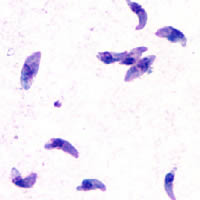
Photo from wikipedia
Cryptosporidium infection is a leading cause of diarrhea-associated morbidity and mortality in young children globally. Single nucleotide polymorphisms (SNPs) in the human protein kinase C-α (PRKCA) gene region have been… Click to show full abstract
Cryptosporidium infection is a leading cause of diarrhea-associated morbidity and mortality in young children globally. Single nucleotide polymorphisms (SNPs) in the human protein kinase C-α (PRKCA) gene region have been associated with susceptibility to cryptosporidiosis. ABSTRACT Cryptosporidium infection is a leading cause of diarrhea-associated morbidity and mortality in young children globally. Single nucleotide polymorphisms (SNPs) in the human protein kinase C-α (PRKCA) gene region have been associated with susceptibility to cryptosporidiosis. Here, we examined the role of protein kinase C-α (PKCα) activity in human HCT-8 intestinal epithelial cells during infection with Cryptosporidium parvum sporozoites. To delineate the role of PKCα in infection, we developed a fluorescence-based imaging assay to differentiate adherent from intracellular parasites. We tested pharmacological agonists and antagonists of PKCα and measured the effect on C. parvum sporozoite adherence to and invasion of HCT-8 cells. We demonstrate that both PKCα agonists and antagonists significantly alter parasite adherence and invasion in vitro. We found that HCT-8 cell PKCα is activated by C. parvum infection. Our findings suggest intestinal epithelial cell PKCα as a potential host-directed therapeutic target for cryptosporidiosis and implicate PKCα activity as a mediator of parasite adherence and invasion.
Journal Title: Infection and Immunity
Year Published: 2022
Link to full text (if available)
Share on Social Media: Sign Up to like & get
recommendations!